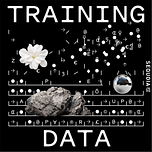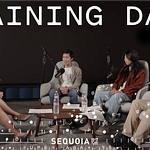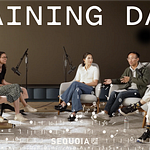Post methodology: Claude 4.0 via custom Dust assistant @TDep-SubstackPost with the system prompt: Please read the text of the podcast transcript in the prompt and write a short post that summarizes the main points. Please make the post as concise as possible and avoid academic language or footnotes. Refer to podcast guests by their first names after the initial mention. Write a brief subhead; The lead is cliché, please rewrite. Light editing and reformatting for the Substack editor.When Dara Ladjevardian was struggling as a solo founder in 2021, he found himself reading about his grandfather—a successful Iranian businessman who had built a 30,000-employee empire before fleeing the revolution with nothing. Dara desperately wanted to ask him for guidance, but his grandfather had suffered a stroke and couldn't speak. A book couldn't answer his specific questions about navigating startup challenges. So Dara did what any AI-obsessed founder would do: he built a digital version of his grandfather using GPT-3 that he could actually talk to.
That deeply personal experiment became Delphi, a platform where people create authorized digital versions of themselves. Dara joined us on Training Data to explain how his company is transforming the way expertise gets shared and consumed.
Unlike Character AI's focus on fictional characters, Delphi emphasizes authentic representation of real people. Users upload their content—podcasts, writings, social media—and the platform builds what Dara calls an "adaptive temporal knowledge graph" that captures not just what someone knows, but how their thinking evolves over time.
The use cases are surprisingly diverse. Sequoia partner Brian Halligan uses his Delphi for product management questions, saving colleagues from interrupting him with queries they can resolve instantly. CEOs scale their decision-making across teams. Dating prospects get pre-screened through digital conversations. One user even had a six-hour phone call with Matthew Hussey's Delphi about relationships.
The platform's most popular digital minds include health expert Mark Hyman, fitness icon Arnold Schwarzenegger, and business thinkers like Lenny Rachitsky. During the episode, we called Arnold's Delphi for workout advice—it delivered his signature motivational style perfectly, recommending a focused 15-minute routine with push-ups and lunges.
What sets Delphi apart in today's rapidly evolving AI landscape is its emphasis on trust and authenticity. Users can only create Delphis of themselves, and the platform includes guardrails against hallucination. As Dara puts it, "We scale humans" rather than automate them away.
The business model is already working. Some creators make millions selling access to their digital minds, treating them as premium courses or coaching sessions. Companies use internal Delphis to maintain alignment as they scale. The platform might one day offer "people-based SEO"—imagine Arnold's Delphi recommending supplements from brands he actually endorses.
Dara predicts 2026 as the tipping point when people won't immediately know whether they're talking to someone's digital mind or the person themselves—though Delphi will always be transparent about the distinction. The goal isn't deception but efficiency, creating what he calls a "top-of-funnel filter" that helps busy people connect more meaningfully.
In a world where AI is transforming how we consume information, Delphi represents a shift toward conversational media. Instead of endless scrolling through feeds, we might soon prefer targeted conversations with digital minds that know us well enough to surface exactly what we need to learn or whom we should meet.
Dara describes a vision of digital minds that become the filter that helps us spend our most precious resource—our energy and attention—on the relationships and conversations that matter most.
Hosted by Sonya Huang and Jess Lee
Mentioned in this episode:
How to Create a Mind: 2012 book by Ray Kurzweil that inspired Dara
The Memoirs of Akbar Ladjevardian: 2008 book about Dara’s grandfather, an Iranian industrialist, that led him to create his first “digital mind”
Build: 2022 book by Tony Fadell that refers to itself as “a mentor in a box”; another inspiration for Dara
The 2 Sigma Problem: 1984 paper by Benjamin Bloom about how students that receive one-on-one tutoring perform two standard deviations better than students educated in a classroom environment











Share this post